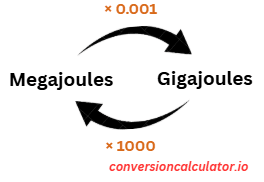HomeEnergy Converter
Energy Conversion Calculator
From joules to calories to kilowatt-hours—track the energy behind every move.Energy Converter
Convert from
Convert to
**Formula:
Discover Other Unit Converters
Try Other Energy Converters
British Thermal Unit to CalorieBritish Thermal Unit to Gigawatt-hourBritish Thermal Unit to JouleBritish Thermal Unit to KilocalorieBritish Thermal Unit to KilojouleBritish Thermal Unit to Kilowatt-hourBritish Thermal Unit to MegajouleBritish Thermal Unit to Megawatt-hourBritish Thermal Unit to ThermsBritish Thermal Unit to Watt-hourCalorie to British Thermal UnitCalorie to ElectronvoltCalorie to JouleCalorie to KilocalorieCalorie to KilojouleCalorie to Kilowatt-hour
Updated on December 1, 2025
Our energy conversion calculator provides fast and reliable conversions across 18 different energy units, like joules, calories, BTUs, kilowatt-hours, electronvolts, and more. It features real-time results, adjustable settings, and a handy history tracker, making your conversions smoother and faster. In this guide, I’ll explain how energy conversions work and how our converter can save you time and effort.About Our Energy Unit Conversion Calculator
Written By Nadiba Rahman
Nadiba Rahman
Reviewed by Mrinmoy Roy
Mrinmoy Roy
Share This Post
URL copied!
What is Energy?
Energy is the capacity to do work. According to the law of conservation of energy, energy cannot be created or destroyed; it can only be converted from one form to another.The standard unit of energy is the joule (J). Depending on the situation, energy is also measured in kilowatt-hours (kWh), calories, British thermal units (BTUs), and more.
Energy comes in different forms, such as mechanical energy (motion of objects), thermal energy (heat), chemical energy (stored in bonds), electrical energy (movement of electrons), nuclear energy (stored in the nucleus of atoms), potential energy (stored energy based on an object’s position, like gravitational or elastic energy), and kinetic energy (energy of motion).There are also several natural sources of energy, such as:
- Solar Energy: Energy from the sun.
- Wind Energy: Energy from moving air.
- Hydroelectric Energy: Energy from moving water.
- Biomass Energy: Energy from organic materials.
Conversion Units of Our Energy Converter
Here are the 18 units you can convert using our energy conversion calculator:- British Thermal Unit (BTU): A BTU is the energy to heat one pound of water by one degree Fahrenheit. It’s used mostly in the United States for heating and cooling systems.
- Calorie (cal): A calorie is the energy to heat one gram of water by one degree Celsius. It’s commonly used in food labeling.
- Erg: An erg is a small energy unit used in physics. One erg equals 1 × 10⁻⁷ joules.
- Electronvolt (eV): An electronvolt measures the energy of an electron when moving through a one-volt potential. It’s used in particle and atomic physics.
- Exajoule (EJ): An exajoule is a very large unit of energy, equal to one quintillion joules (1,000,000,000,000,000 J).
- Foot-pound (ft-lb): It represents the energy required to move one pound a distance of one foot. It’s often used in mechanics and engineering.
- Gigajoule (GJ): A gigajoule is one billion joules (1 GJ = 10⁹ joules). It is commonly used in large-scale energy applications.
- Gigawatt-hour (GWh): A gigawatt-hour is a unit of energy equivalent to one gigawatt of power used for one hour. It measures electricity generation and use.
- Joule (J): The joule is the SI unit of energy. It represents the energy needed to move one coulomb of electric charge through a potential difference of one volt.
- Kilocalorie (kcal): A kilocalorie, also called a large calorie, is 1,000 calories. It measures the energy in food.
- Kilojoule (kJ): A kilojoule is 1,000 joules. It’s used for nutrition and scientific work.
- Megajoule (MJ): A megajoule is one million joules (1,000,000 J). It’s used in the energy and heating fields.
- Megawatt-hour (MWh): It’s equivalent to one megawatt of power consumed over one hour. It is frequently used in electricity generation and consumption.
- Natural Gas Low Heating Value (NG LHV): It measures the heat released by burning natural gas but excludes the energy from vaporizing water.
- Newton-meter (N·m): It is defined as the energy used to move an object one meter with a force of one newton. It measures energy in the metric system.
- Therm: A therm is a unit of heat energy used in natural gas. One therm equals 100,000 BTUs.
- Watt-hour (Wh): It’s equivalent to one watt of power used for one hour. It is commonly used to measure the energy consumed by electrical devices.
- Watt-second (Ws): A watt-second is the amount of energy used when one watt of power is consumed for one second. It’s used in electrical and scientific contexts.
How to Use Our Energy Conversion Calculator?
To use our energy conversion calculator, follow the easy steps below:- Select the energy units you want to convert from and to.As soon as you choose the units, a real-time formula preview appears that helps you understand the conversion between the selected units.
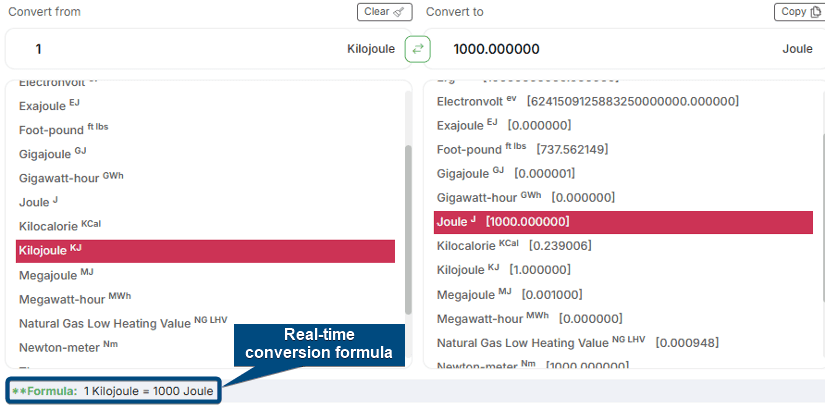
- Input the energy value in the source field.

- The converted result will appear immediately in the target unit. You can even copy the result instantly with our one-click copy option.

Features of Our Energy Conversion Calculator
Our energy conversion calculator includes powerful features to handle even the most precise energy conversions. You can access all these features from the settings menu. Here’s how each feature supports your work:Real-time Multi-unit Conversion
Energy values often need to be viewed in multiple units. Our calculator displays the equivalent values in all standard energy units instantly, so you don’t have to convert each unit manually.For instance, if you enter 150 joules, it automatically shows kilocalories, BTUs, and more, helping you cross-check data and share results seamlessly.
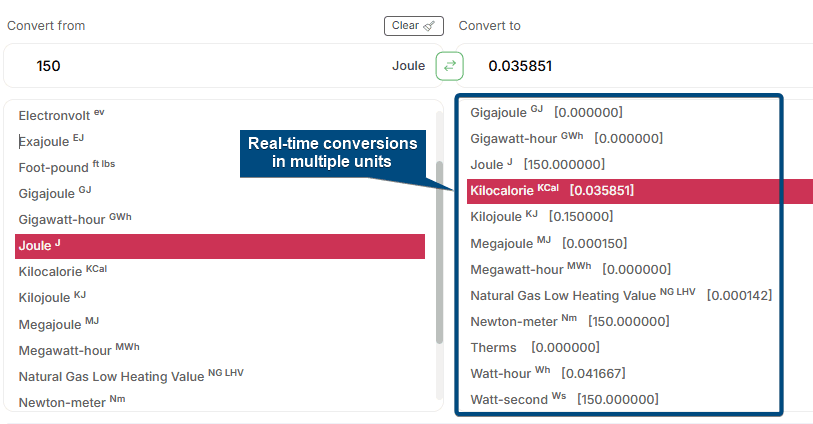
Flexible Decimal Precision
Even a small error in energy conversion can cause incorrect calculations or analysis. That’s why our energy conversion calculator lets you set your desired level of decimal precision.By default, results are displayed up to 6 decimal places, but you can adjust this to any value between 0 to 12 decimal places in the settings menu. This flexibility ensures you get the exact level of precision you need for your project or analysis.
Rounding Mode Control
When working with energy conversions in critical applications, even small differences can impact heating calculations, efficiency assessments, or system sizing accuracy. That’s why our calculator includes rounding mode control.You can choose to round up, round down, or turn off rounding completely. This ensures your converted energy values meet your project’s exact requirements and reduces the risk of calculation errors.
Multiple Number Format
Energy can be as small as nanojoules or as large as terajoules. To make these numbers easier to read and work with, our calculator lets you choose from three formats:- Standard Decimal (like 5,000,000,000 J)
- Scientific Notation (like 5.0e+9)
- Engineering Format (like 5.0 × 10^9)
Thousand Separators Toggle
Energy values can get very large and hard to read, especially in industrial settings. Our toggle lets you turn on thousand separators, making big numbers clearer and easier to review. For example, instead of seeing 12345678 joules, you’ll see 12,345,678 J.One-click Unit Swap
When checking energy conversions, it’s often helpful to see the values both ways, for instance, converting calories to joules and then back to double-check your work. Our one-click unit swap quickly reverses the input and output units with just one click, making your process faster and more accurate.Clickable and Auto-Saved Conversion History
When working with energy conversions, it’s easy to lose track of your past results. Our calculator automatically saves your last 10 conversions, even if you refresh or close your browser, so you can quickly find and reuse them without retyping.Simply open the History tab and click on any previous entry to load it right away. This makes your work faster, more organized, and error-free.
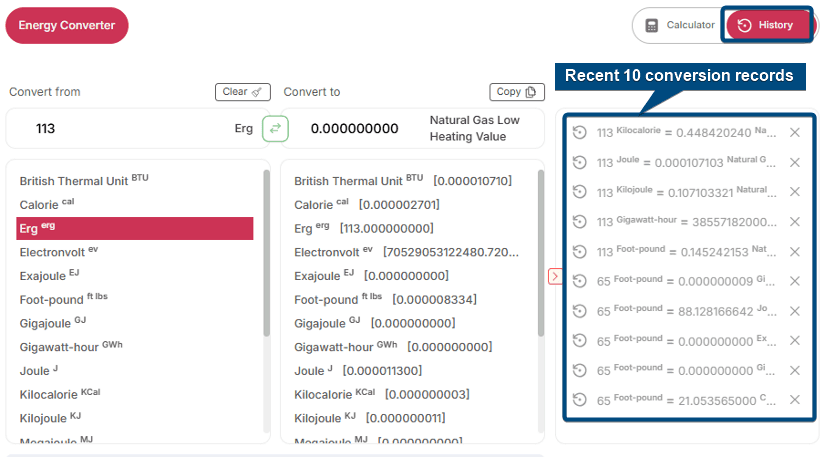
Energy Conversion Chart
Click the button below to download the energy conversion chart. This chart provides conversion factors for all your energy calculations.3 Examples of Conversion With Our Energy Converter
To convert energy units accurately, you need to know the source unit, the target unit, and the correct conversion factor (you can find these in the Energy Conversion Chart above). The formula is simple:Converted Value = Conversion Factor × Value of Source UnitHere are three quick examples:Joules (J) to Kilocalories (kcal) Conversion
To convert joules to kilocalories, multiply the joule value by the conversion factor 0.000239. For example, to convert 1000 joules to kilocalories:1000 × 0.000239 = 0.239006 kilocalories
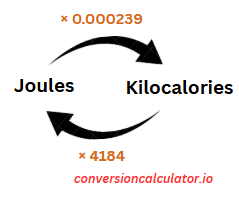
British Thermal Units (BTU) to Watt-hours (Wh) Conversion
To convert BTUs to watt-hours, multiply the BTU value by 0.293072. For example, to convert 500 BTUs to watt-hours:500 × 0.293072 = 146.536 watt-hours
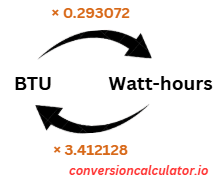
Megajoules (MJ) to Gigajoules (GJ) Conversion
To convert megajoules to gigajoules, multiply the megajoule value by 0.001. For example, to convert 4300 MJ to GJ:4300 × 0.001 = 4.3 GJ
